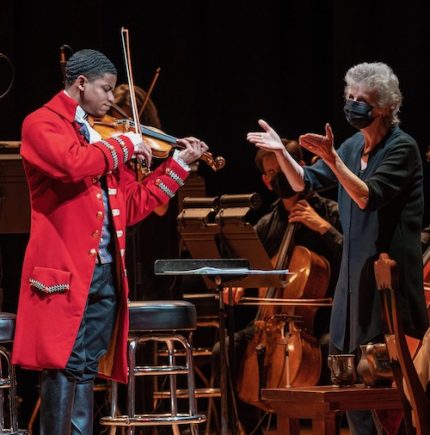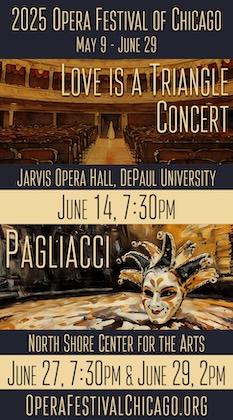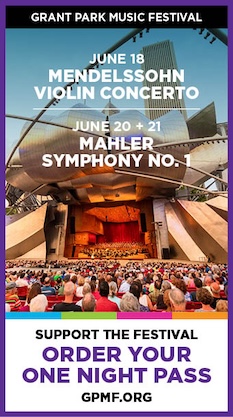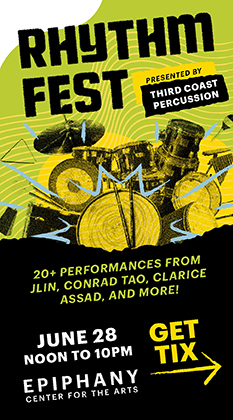MOB’s “Chevalier” turns the life of Joseph Bologne into fascinating “concert theater”

[Note: The posting of this review was delayed due to technical issues.]
Eighteenth century Europe had more than its share of remarkable personalities but few were as fascinating or as accomplished as Joseph Bologne, Chevalier de Saint-Georges (1745-99).
Born on the French Caribbean island of Guadeloupe, the son of an enslaved woman of Senegalese origin and a French plantation owner, Bologne was placed in a French boarding school as a young man by his loving father, who relocated himself, his wife and Joseph’s mother shortly thereafter.
Largely because of his father’s social station, the biracial Bologne fought and overcame grievous racism and social barriers to become an archetypal romantic hero of his time. He was highly esteemed as much for his outsized feats as an athlete, swordsman, equestrian and war hero as his considerable musical gifts as composer, conductor and virtuoso violinist. Apparently the handsome, strapping young man was a virtuoso Lothario as well – his numerous open affairs earned him the nickname “The Black Don Juan.”
He gave music lessons to Marie Antoinette yet was an ardent abolitionist, fighting on the side of the Republic during the Revolution and later leading the first all-black regiment in European history. Alexandre Dumas père could have built an entire novel around him and his exploits.
Long forgotten and only recently revived, Bologne is now the subject of an absorbing and illuminating “concert theater” piece, “The Chevalier,” presented last weekend in Chicago and Skokie under the auspices of Music of the Baroque (MOB) and the Chicago Symphony Orchestra Association. This reviewer caught the second of three performances Saturday night at the North Shore Center for the Performing Arts in Skokie.
Written and directed by Bill Barclay, a playwright, actor, musician and former music director of Shakespeare’s Globe in London, “The Chevalier” is seen here in an 80-minute version first staged at Tanglewood’s Learning Institute in Massachusetts in 2019. (A full-length version is scheduled to be given at the National Black Theatre Festival in Winston-Salem in September.) The Tanglewood-Chicago edition employs four actors, solo violinist Brendon Elliott and MOB musicians under Jane Glover.
“The Chevalier” is, in essence, a musico-theatrical riff on a historical footnote. Barclay imagines what might have ensued had Bologne and Wolfgang Amadeus Mozart – who shared lodging in a Paris mansion for two months in 1778 – hung out together, shared ideas and taken musical inspiration from each other.
With smoothly integrated dialogues, semi-staging and live music, the concert-theater work draws its soundtrack mainly from Bologne’s instrumental and orchestral catalog, particularly the violin concertos, of which he composed 14 for his own use as concert soloist. These concertos reveal the chevalier at his finest: graceful galante inspirations that can easily hold their own against those Mozart wrote for the instrument.
Bologne’s bravura solo writing, with flashy string crossings and vertiginous leaps into the high register, confirms he was as dashing a fencer on the fiddle as he was with the blade. Why don’t we hear this music more often? Clearly there are a lot more such gems waiting for discovery, along with other pieces from a catalogue that includes 12 symphonies, 18 string quartets and much else.
The gifted young Elliott, a three-time concerto competition winner costumed as Bologne, brilliantly dispatched movements from four concertos, also a symphonie concertante suggested here as the model for Mozart’s own Sinfonia Concertante, K. 364. Elliott was simply terrific in every department – his tone warmly beautiful, his intonation impeccable, his feeling for the style assured, as the dramatic action cut away at regular intervals to his playing. Let’s hear more of him.
Long celebrated as a Mozart interpreter, Dame Jane proved herself a worthy advocate for Bologne’s unfamiliar music as well, securing crisp, stylish playing from a band of MOB strings and winds, rescuing worthy music from long neglect. Yasuko Oura made equally stylish work of her varied assignments on fortepiano.
The theater portion of Barclay’s concert-theater piece engages the chevalier in semi-staged dialogues with Mozart, Queen Marie Antoinette and playwright Pierre Choderlos de Laclos that reflect on racial equality, social injustice and other themes.
Bologne, portrayed with strength and nuance by the fine New York-based actor RJ Foster, comes across as wry, self-confident and clear-headed, a hardy survivor of the racism and social-political turmoil that engulfed late-century France. “How do you stay so centered when people want to destroy you?,” Mozart asks Bologne. “Practice,” the latter calmly replies.
Barclay himself assumes the role of the conceited Captain de Laclos, here part emcee, part foil to Bologne (he wrote the libretto for the composer’s first opera, now lost), commanding the action like the experienced stage performer he is.
Merritt Janson also is very good as the queen, bringing out the sexual innuendo in her music-lesson scene with Bologne, conversant about music but blind to the gathering social-political upheaval that would send her to the scaffold. About the only thing the doomed queen and her libertarian tutor agree on, voiced at the climax of the show, is that both are “mirages of free will.”
David Joseph has his choice actorly moments as Mozart but cannot be blamed for the heavy-handed reductionism, turning the Salzburg enfant terrible to a rather crude ninny, all too reminiscent of Peter Schaffer’s portrayal in Amadeus. Mozart’s alleged shortcomings (as a human being, not composer) become a dramatic device to amplify Bologne’s virtues. The show stumbles on that misreading of history, fortunately not fatally.
Chicago’s unofficial celebration of the music of Joseph Bologne will continue with the first local professional staging of his only extant opera, L’amant anonyme (The Anonymous Lover), by Haymarket Opera Company under Craig Trompeter. Dates are June 17-19, Jarvis Opera Hall at DePaul University.
Posted in Performances


